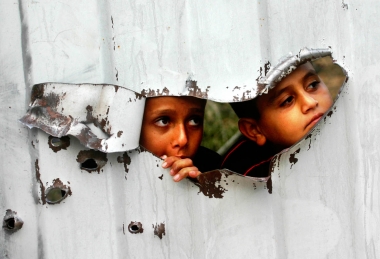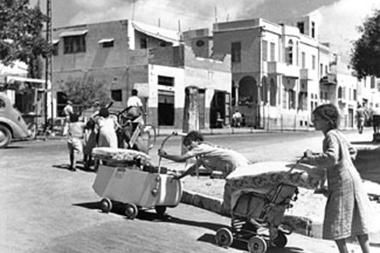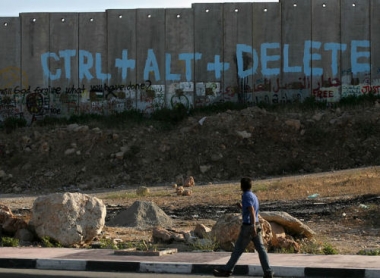Voices across the Divide
Think about it!
Suggestions for classroom and public discussion
-political cartoonist. Michael Leunig:
“The work of the artist is to express what is repressed or even to speak the unspoken grief of society. And the cartoonist’s task is not so much to be balanced as to give balance, particularly in situations of disproportionate power relationships such as we see in the Israeli-Palestinian conflict. It is a healthy tradition dating back to the court jester and beyond: to be the dissenting protesting voice that speaks when others cannot or will not.”
-Professor of English and Comparative Literature, author, and Palestinian activist, Edward Said:
“All knowledge that is about human society, and not about the natural world, is historical knowledge, and therefore rests upon judgment and interpretation. This is not to say that facts or data are nonexistent, but that facts get their importance from what is made of them in interpretation… for interpretations depend very much on who the interpreter is, who he or she is addressing, what his or her purpose is, at what historical moment the interpretation takes place.”

General approach
- What were your specific images of this conflict before seeing the film, i.e. can you remember photos, headlines, films or novels you associate with this conflict? Which images in this film are the most consistent with your prior knowledge? Which are the most new to you? Did the new images make you uncomfortable? If so, why?
- How does Voices Across the Divide change your understanding of the Israel/Palestine conflict? In what ways?
- Define the “Divide” in Voices Across the Divide?
- Do you consider this documentary controversial? Explain why or why not?
- What are the dominant perspectives and assumptions about this topic in the US media; does that support or conflict with the information in this documentary?
- How do you learn history? What is objective? What have we learned from Native American history? African-American history? Women’s history? Labor history? Does history told by the victors differ from history told by the victims? Give examples.
- There have been many military occupations in modern history. These include: the US occupation of Cuba before World War I, the Allied occupation of much of the Turkish Empire in World War I, the Japanese occupation of Manchuria and the German occupation of many European countries during World War II, the Iraqi occupation of Kuwait and the US occupations of Iraq and Afghanistan after World War II. How is the Israeli occupation of the West Bank and Gaza different or the same as other occupations? Does the Israeli settlement of the West Bank and the siege of Gaza qualify as an occupation?
- Review the timeline on the website. Is it different or the same when compared to other historical accounts you have seen? How and why?
- How is the experience of loss or dispossession shared with and experienced in multiple generations? Give examples.
The personal narrative
- How does the telling of personal stories affect your understanding of history?
- What narrative struck you the most and why?
- Pick a full interview on the website and explore one person’s narrative in depth. What new understanding did you develop?
- What is the impact of a Jewish woman collecting the narratives of Palestinians and producing the documentary?
- Review a report on TV, radio, the internet, or newspaper and make a list of the vocabulary and assumptions used by journalists covering this conflict. Compare your list to the words and assumptions used by the people interviewed in the film. How do the words and assumptions vary? Why? Think about the difference between the words: Jewish settlement and Jewish neighbourhood to describe Israeli Jews living in East Jerusalem and the Occupied Territories. Review the film, “Peace, Propaganda and the Promised Land,” for more examples and analysis.

Identity and the Other
- How do you define your identity?
- How does the way you define yourself affect your perception of other people in Israel/Palestine?
- How do you explore and understand the identity of people different than you?
- Is the experience of Palestinian immigrants to the US different or the same when compared to other immigrants? How does this compare to your own family’s immigration stories?
- Define “culture shock.” How did cultural differences affect Palestinian immigrants coming to the US?
- What stories, feelings, experiences in the film feel similar to your own?
Your role in your social context
- Why is this conflict so hard to talk about in the United States?
- Everyone begins with a bias or point of view. Can you define your biases when talking about this conflict and how that shapes your understanding?
- How does your knowledge of anti-Semitism and the Holocaust inform your understanding of the Israel/Palestine conflict?
- How does your knowledge of anti-Arab racism, Islamophobia, and the Nakba inform your understanding of the Israel/Palestine conflict?
- What does “balance” mean in this context? Can history be “objective”? What is the impact of the dominant social narrative? For instance, do you demand “balance” when hearing a favourable, uncritical report about Israeli governmental policies, Israeli incursions into Gaza, the experience of Jewish settlers, bomb attacks in Sderot? Why or why not?
- What is the difference between anti-Semitism and principled critique of Israeli policy?
- How does art (film, literature, music, humour, etc) affect the social context?
- Is there a role for voices of dissent? What is that?

Our role as global citizens
- How would you define global citizenship?
- Once you understand better the experiences, loss, trauma, etc of a previous less known population, what is your responsibility as a US or global citizen?
- Does knowledge without action make you a bystander?
- If you act upon your new understanding, what could you do amongst friends, family, in your classroom, in organizations, in social media, as a voter? What resources can you name, (books, websites, films, organizations)?
- What next steps will you take as a result of seeing this documentary film? What pushback do you expect and how will you deal with it?
- How does economic pressure, such as the boycott, divestment, and sanction movement, affect Israel’s political behaviour and reputation as a modern Western democracy? How have similar movements worked in the past, consider South Africa as an example?
View a PDF of the timeline associated with our documentary >